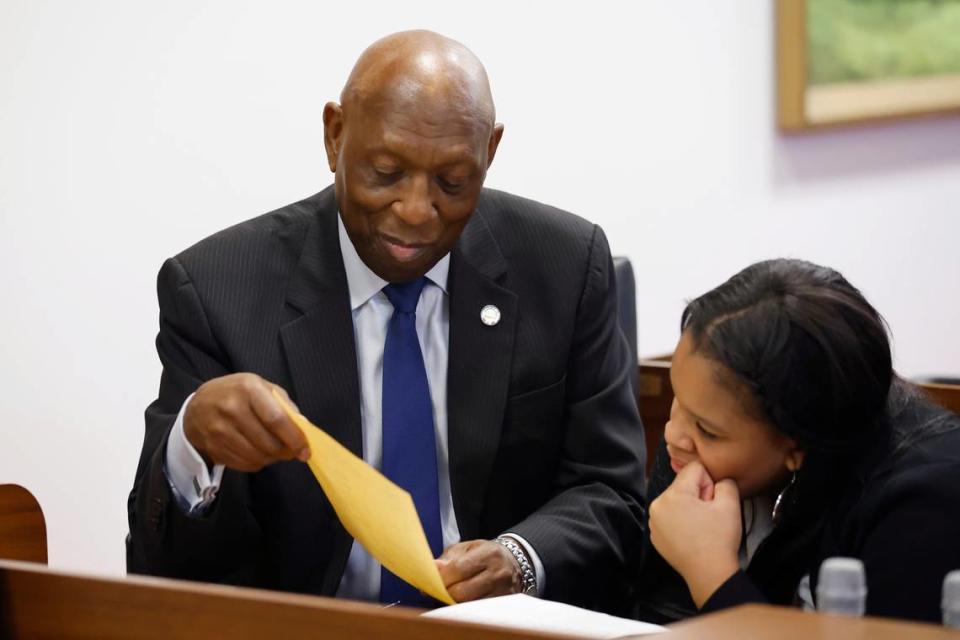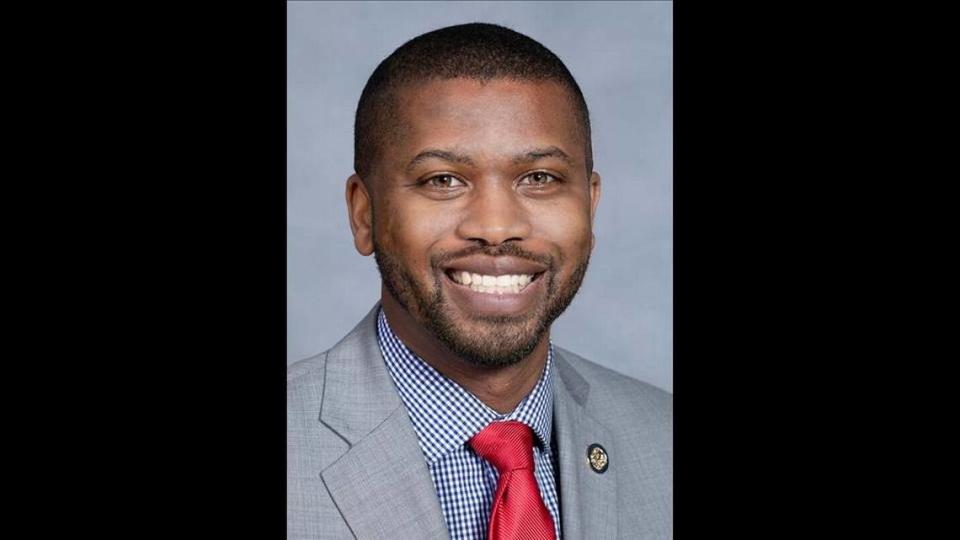Even with the GOP’s supermajority, these NC Democrats are key swing votes to watch
- Oops!Something went wrong.Please try again later.
- Oops!Something went wrong.Please try again later.
When the North Carolina House passed legislation last week to ban transgender athletes from playing on women’s sports teams, the vote fell almost entirely along party lines.
Republicans, who said House Bill 574 was necessary to protect opportunities for female athletes and maintain fairness in women’s athletics, stuck together and all voted in favor of it. Democrats, who said the bill was discriminatory and trying to solve a problem that doesn’t exist, voted against it — with three exceptions.
Had that vote taken place a month ago, the trio of Democrats voting for the bill might have been in a much brighter spotlight. The stakes were higher: Democrats needed every one of their members to band together to sustain Gov. Roy Cooper’s vetoes, which they could do only by the slimmest of margins: one vote. But after Rep. Tricia Cotham switched parties, Republicans regained a supermajority in the House, giving them the ability to pass legislation over vetoes all on their own.
Cotham’s switch reduces the political leverage held by moderate or independent-minded Democrats who vote with Republicans, and could diminish their influence over the legislative process. But the GOP being able to enact bills on their own doesn’t necessarily change how those Democrats will approach votes that could put them at odds with the rest of their party, as last week’s vote on the ban on trans athletes showed.
“My mode of operation is, each bill when it comes up, I’m going to look at the pros and look at the cons, and then use my experience and what I know, I’ll make a decision based on that,” Rep. Shelly Willingham of Edgecombe County told The News & Observer last week, after the vote on HB 574. “I won’t be considering whether this is something that so many other folks are doing, or that I should consider doing it. That’s not part of my equation.”

Willingham, along with Reps. Garland Pierce of Scotland County and Michael Wray of Halifax County, voted in favor of HB 574. The three Democrats, along with a couple of their colleagues, have shown a willingness this year and in the past to break ranks with the House Democratic Caucus and support certain Republican bills that the rest of their colleagues vehemently oppose.
They remain some of the key lawmakers to watch, since their votes will become crucial if any priority of legislative leadership doesn’t have the votes of every Republican. One of the year’s big questions is whether the GOP will be able to unite on new abortion restrictions.
Willingham said the issues at play during last week’s debate on HB 574 are important, but said he doesn’t think the issue of trans athletes competing in North Carolina is “widespread.” He also said he felt lawmakers on both sides of the debate “went to the extreme” when they were talking about what could happen if the bill did or did not pass.
Ultimately, he said that while he didn’t have strong feelings either in support of the bill or against it, he knew that a majority of his constituents would probably support it, and recognized that his decision wouldn’t change the outcome of the vote.
How the Democratic Caucus responded to defection
Rep. Cecil Brockman of Guilford County is another Democrat who is a possible swing vote when it comes to certain bills.
Brockman voted against the ban on trans athletes but received criticism from the left, as did Cotham and Wray, for missing a key vote last month that allowed Republicans to override Cooper’s veto of a major gun rights bill.
Brockman said he doesn’t expect Republicans to stop trying to pass bills in a bipartisan way, despite having supermajorities in both chambers.
“The Republican Party isn’t a monolith, just like the Democratic Party isn’t a monolith, and they don’t agree on everything,” Brockman said in an interview last week, before the vote on HB 574.
Brockman acknowledged that Democrats have less leverage than before, since Republicans aren’t reliant on them to circumvent vetoes, but said that House Speaker Tim Moore “has always been someone who has tried to get bipartisan support for legislation,” and said that it helps Republicans politically to say that they “were able to get some Democrats on board.”
When Cotham announced she was joining the GOP, the news sent shock waves throughout the world of North Carolina politics. Democrats said Cotham had betrayed the constituents who elected her, and called on her to resign. Brockman, on the other hand, said Democrats had only themselves to blame, and said that the party should treat her defection as a wake-up call about how it reacts to “people making the decisions that they make.”

Now that some time has passed, Brockman said he believes Democrats are in a better place.
“I think the whole entire caucus has actually done a good job of taking a look at how something like this could have happened,” Brockman said. “And I think we’re all trying to figure out how we can be better to each other, and I think that’s an absolutely great thing, and I think that’s going to help us moving forward.”
Brockman also said he thought House Democratic Leader Robert Reives, the head of his caucus, “has done a great job of trying to corral everybody together, and trying to make sure everybody knows that they are a wanted member of the caucus.”
Primary threats not productive, Democrats say
Like Willingham, Brockman said his approach to bills will remain the same as it has always been: voting his conscience, and not letting anyone pressure him or “determine how I vote.”
He also said Democrats could do a better job of reminding their allies on the left that it’s counter-productive to threaten members of the party who sometimes vote with Republicans with a primary challenge in the next election.
“I do believe leadership could do a better job in (tamping) down some of these kind of progressive groups that try to go after their members — they could send a message to say this isn’t acceptable,” Brockman said. “And if you want to raise money, if you do want to help us take back the House or the Senate, then you use that money to go against Republicans, and not against Democrats.”
Controversies within the Democratic Party over members siding with Republicans aren’t new.
In 2019, current U.S. Rep. Don Davis was the only Democrat in the state Senate to vote in favor of a GOP bill that directed physicians to care for newborns who survive abortions, and that would have imposed penalties for medical professionals who didn’t comply. Groups that urged Democrats to vote against the bill, including Lillian’s List and Planned Parenthood, reacted by announcing that they wanted to recruit a primary challenger to take on Davis.
When Brockman, Cotham and Wray missed the override vote on the gun bill last month, the progressive group Carolina Forward said it would raise money to hold them accountable for refusing to uphold Cooper’s veto “of a dangerous bill to loosen NC’s gun safety laws.”
And when the Senate was considering a GOP bill to increase penalties for rioting, which six House Democrats had already voted for, critics of the bill told Democrats who were thinking of supporting it that they would be held accountable as well. Willingham, who co-sponsored the bill with Moore and other Republicans and spoke in favor of it during multiple committees, said he wasn’t bothered by calls for accountability, but said that he thought that approach by opponents of the bill was a mistake.
“If you tell somebody, “If you don’t agree with what I think is right, then you are wrong, and we’re going to get you,” then I think that’s the wrong way to go,” Willingham said.
Brockman said that not only are threats to prop up a primary challenger not helpful, but said he believes that Black Democrats tend to get more criticism from the party than white Democrats do for being open to talking with Republicans and fighting for their districts.
“I think they want to keep you in line; they expect, you know, you’re a young Black person, and I think they sometimes have a hard time listening to us, if it’s an opinion they don’t think we should have,” Brockman said. “Sometimes they just want to put us in our place, and we’re supposed to vote how they think we should vote.”
With Republicans having full control of the legislature, Brockman said that if he wants to get anything done, he has to talk to GOP lawmakers.
“It’s not fair for Democrats to tell me I have to wait until Democrats get back in charge in order for me to get (something) for the poor, Black district that I represent.”

